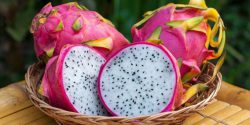Persimmon benefits for females and males and hair and weight loss
Persimmon benefits
Persimmon benefits for females and males and hair and weight loss on Nicholi site. We hope this article will be of interest to you.
The text describes the benefits of persimmon for health, including cardiovascular health, immune system, digestive system, anti-cancer, skin health, weight loss, reducing the risk of respiratory diseases, and improving bone health. It also mentions some potential side effects of persimmon such as increased blood sugar levels, allergy, digestive problems, and weight gain. The article explains the benefits of persimmon for both men and women, such as cancer prevention, immune system strengthening, and improved skin health. Lastly, it highlights the benefits of persimmon for skin health, such as anti-inflammatory, skin cleansing, and anti-wrinkle. The text discusses the benefits of dried persimmons, including their potential to improve heart health, prevent certain types of cancer, reduce the risk of diabetes, strengthen the immune system, improve bone health, reduce inflammation, increase energy, improve digestion, reduce stress, and facilitate memory improvement. However, it is important to consume dried persimmons in moderation as they contain natural sweeteners that may cause blood sugar to rise. People with diabetes should be cautious and limit their consumption, and it is best to consult with a specialist doctor.
Persimmon benefits
Persimmon is one of the delicious and nutritious fruits that have many benefits for the health of the body. Below are some of the benefits of persimmon:
Cardiovascular: Persimmons contain a lot of potassium, which can lower blood pressure and thus help maintain cardiovascular health. Also, persimmon contains antioxidants such as vitamin C and flavonoids that can help reduce the risk of heart diseases such as heart pain and heart attack.
Immune system: Persimmons have a lot of vitamin C, which can help in strengthening the immune system. This vitamin as an antioxidant can also protect the body’s vulnerability against various infections and diseases.
Digestive: Persimmons have a large amount of fiber that can help improve digestive function and reduce the risk of digestive-related diseases. Also, persimmons contain large amounts of water, which can help prevent constipation and maintain the health of the digestive system.
Anti-cancer: Persimmon contains antioxidants such as flavonoids and carotenoids, which can be effective in preventing the occurrence of some types of cancer, such as prostate cancer and lung cancer.
Improves skin health: Persimmons contain vitamin C and antioxidants that help improve skin health and protect it from environmental damage.
Aids in weight loss: Persimmons contain fiber that can help lower blood sugar levels and thus help in weight loss.
Reducing the risk of respiratory diseases: Persimmons contain vitamin C, which can help reduce the risk of respiratory diseases related to inflammation.
Improves bone health: Persimmons contain a significant amount of calcium, which helps improve bone health.
Persimmon side effects
In general, as a natural fruit, persimmons do not pose any health risks and are generally safe for most people to consume. However, in case of overdose, some side effects may occur. Some side effects may include:
Increased blood sugar levels: Excessive consumption of persimmons can increase blood sugar levels in diabetics.
Allergy: Some people may be allergic to persimmons and experience symptoms such as itching, swelling, flu, difficulty in breathing, or symptoms of shortness of breath.
Digestive problems: In some people, persimmon consumption may cause symptoms of digestive discomfort such as heartache, indigestion, heartburn, or diarrhea.
Weight gain: Persimmons contain sugar and calories, and consuming too much of them can cause weight gain.
In general, if you are not allergic to persimmons and keep your intake to a normal level, side effects are much less likely. However, if you experience any symptoms of discomfort after consuming persimmons, it is best to consult your doctor.
Persimmon benefits for female
Persimmon is one of the fruits that are very useful and nutritious for the health of the body due to its high amount of Vitamin C and antioxidants. Some of the benefits of persimmon for women’s health are mentioned below:
Improving heart health: Persimmons contain a lot of potassium, which can lower blood pressure and reduce the risk of heart disease.
Cancer prevention: Persimmons have antioxidants that can be effective in preventing some types of cancer such as breast cancer and uterine cancer.
Strengthening the immune system: Vitamin C and antioxidants in persimmons can help strengthen the immune system and be effective in preventing infectious diseases.
Improves digestion: Persimmons can help improve digestion and control blood sugar due to their soluble fiber.
Improves skin health: Vitamin C in persimmons can help improve skin health and protect against UV damage.
Improves bone health: Persimmons contain a large amount of vitamin K, which can help improve bone health and reduce the risk of bone-related diseases such as osteoporosis.
Because persimmons have many vitamins and nutrients, their consumption is very beneficial for women’s health.
Persimmon benefits for male
Persimmon is one of the fruits that have many properties for body health. Below are some of the benefits of persimmon for men’s health:
Cancer prevention: Persimmons have antioxidants that can be effective in preventing some types of cancer such as prostate and lung cancer.
Improving sexual performance: Due to the high amount of zinc and vitamin C, persimmons can help improve sexual performance and reduce problems caused by testosterone deficiency.
Strengthening the immune system: Vitamin C and antioxidants in persimmons can help strengthen the immune system and be effective in preventing infectious diseases.
Improve skin health: Due to its vitamin C and antioxidants, persimmons can help improve skin health and protect against UV damage.
Improving brain and nerve health: Persimmons can help improve brain and nerve health and reduce the risk of brain and nerve diseases such as Alzheimer’s due to having large amounts of vitamin K and folate.
Persimmon benefits on skin
As a rich source of vitamin C, persimmons can contribute to skin health. Some of the benefits of persimmon for the skin are:
Anti-inflammatory: Vitamin C in persimmons can act as an antioxidant and reduce skin inflammation.
Keeping the skin healthy: Vitamin C plays a role in collagen production, which keeps the skin healthy and youthful.
Protects the skin from sun damage: Persimmons contain antioxidants such as flavonoids and carotenoids that can help protect the skin from damage caused by the sun’s UV rays.
Anti-wrinkle: As a rich source of vitamin C, persimmons can help skin health and help reduce wrinkles and fine lines caused by skin aging.
Skin cleanser: Consuming persimmons can improve liver function and help eliminate toxins from the body, which can be effective in skin cleansing.
Overall, consuming persimmons can contribute to skin health as a rich source of vitamin C and antioxidants. However, persimmons alone are not enough and you should follow a healthy diet and skincare to get the best results.
Persimmon benefits for hair
As a rich source of vitamin C, minerals, and antioxidants, persimmons can contribute to hair health. Some of the benefits of persimmon for hair are Vitamin C in persimmons can act as an antioxidant and help strengthen hair. Persimmon consumption can strengthen hair roots and prevent hair loss. Vitamin C and minerals in persimmons, such as iron, calcium, and potassium, help nourish and grow healthy hair. Persimmons contain a lot of water, which can help maintain hair moisture and prevent dryness and brittleness. Persimmon can act as a natural moisturizer for dry and damaged hair and by reducing their dryness and brittleness, softer and smoother hair can be obtained. Therefore, persimmon consumption can help hair health and strengthen it, reduce hair loss, accelerate hair growth, maintain hair moisture, and treat dry and damaged hair.
Persimmon benefits for weight loss
As a rich source of fiber, water, and vitamin C, persimmons can help you lose weight. Some of the benefits of persimmons for weight loss include: Persimmons have a significant amount of fiber, which can help reduce appetite and increase satiety. Persimmon fiber can reduce fat absorption from food and prevent weight gain. Persimmons have a good amount of fiber that can help reduce blood sugar and, as a result, help in weight loss. Vitamin C in persimmons can help increase the body’s energy level and help lose weight due to increased body activity. Persimmons contain a lot of water, which can help meet the body’s need for water, and thus help in weight loss. Therefore, consuming persimmons as a rich source of fiber, water, and vitamin C can help with weight loss and help reduce food cravings, reduce fat absorption, lower blood sugar, increase energy levels, and provide hydration to the body. Also, for the best results in weight loss, persimmons are recommended as part of a healthy and varied diet.
Persimmon fruit benefits for diabetes
Persimmon is a fruit rich in nutrients and health properties that can help control diabetes. Some of the benefits of persimmon for diabetes include:
Blood sugar control: Persimmon contains a lot of fiber that helps control blood sugar. Fiber reduces the absorption of sugar in the intestines, and this feature is very important for diabetics who have problems controlling their blood sugar.
Reducing the risk of heart disease: Diabetics are at risk of heart disease. Persimmons contain powerful antioxidants that help reduce the risk of diabetes-related heart disease.
Reduces inflammation: Persimmons contain flavonoids that help reduce inflammation and balance blood sugar levels. Inflammation is one of the factors that may aggravate the symptoms of diabetes.
Vitamin C supply: persimmons are rich in vitamin C, which can help reduce the symptoms of diabetes. This vitamin helps to increase the immunity of the body and prevent the occurrence of diseases related to diabetes.
Reducing the risk of infection: Diabetics are at risk of various infections due to their weak immune systems. As a rich source of vitamin C and fiber, persimmons can help increase the body’s immune system and reduce the risk of infections.
Can a diabetic patient eat a persimmon?
Yes, diabetics can eat persimmons. In fact, persimmon is a healthy and nutritious fruit for diabetic patients. However, for better blood sugar management, the amount of persimmon consumption should be adjusted to the total amount of carbohydrates consumed per day. It is better for diabetic patients to consult their doctor or nutritionist to optimize their diet to control diabetes. Also, if you have symptoms of persimmon allergy, you should stop using it and consult your doctor.
How much persimmon can a diabetic eat?
In general, persimmons are safe for most diabetics. But the amount of persimmon that a diabetic patient can consume depends on the blood sugar level and the type of diabetes. Persimmon fruit contains a significant amount of fiber and therefore, can help control blood sugar. However, for better blood sugar control, it is better to limit persimmon consumption to a reasonable amount and use it together with other things such as other fruits and high-fiber foods. Also, if you are a diabetic patient, it is better before consuming any new fruit consult your doctor.
Persimmon fruit benefits during pregnancy
Persimmon fruit contains important nutrients such as vitamin C, fiber, potassium, and folate, which are very useful for fertility and healthy pregnancy. One of the main benefits of persimmons during pregnancy is increasing folate levels. Folate is one of the important vitamins prevent neuro tube diseases in the fetus and spinal cord that can lead to serious disorders in the child’s spinal cord. Also, persimmon fruit has a significant amount of fiber, which is useful in controlling blood sugar and regulating digestion. In addition, persimmons also contain a good amount of vitamin C, which is beneficial for skin health and increases the absorption of iron from food. Also, the potassium in persimmons can help maintain cardiovascular health. In general, consuming persimmon fruit during pregnancy is very useful for improving the health and development of the fetus. However, it is always best to consult your doctor before consuming any new fruits and foods.
Persimmon fruit how to eat
Persimmon fruit can be consumed in two ways, edible and non-edible.
In the eating method, first, the skin of the persimmon should be carefully cleaned, then it should be cut in half and the core should be carefully removed. Then, with a knife or the tip of a fork, separate the persimmon flesh from the skin and eat it.
In a non-edible way, persimmons can be placed as a decoration among other fruits, and they can also be prepared as juice, compote, jam, or jelly.
In both methods, the important thing is that persimmons are a fruit with natural sweetness and natural sugar, for this reason, it is better to control its consumption in moderate amounts and if you have diabetes, consult your doctor before consuming persimmons.
One medium persimmon calories
Persimmon fruit has about 66 calories per 100 grams. In this way, an average persimmon has about 82 calories. This amount of calories is much lower than other fruits such as grapes and bananas, and therefore persimmons can be beneficial as part of a healthy diet and weight loss. Persimmons also contain fiber, vitamin C, and minerals such as potassium that help the body’s health.
How many persimmons can you eat a day?
Persimmon consumption for each person depends on personal characteristics and daily needs. However, for most healthy adults, about 2 to 3 persimmons per day can be eaten as part of a healthy diet. Considering that persimmons have a natural sweetness and natural sugar, people with diabetes should consult their doctor before consuming persimmons. Also, always consider consuming persimmons along with other fruits and healthy and varied foods in your diet.
Persimmon recipes
Persimmon instructions are as follows:
Ingredients:
4 to 5 dates
2 tablespoons of fresh lemon juice
2 tablespoons of sugar
A teaspoon of cinnamon powder
A teaspoon of grated ginger
How to prepare:
Wash the dates with water and then dry them and divide them into smaller pieces.
In a mixing bowl, mix lemon juice, sugar, cinnamon, and ginger together.
Add the chopped persimmons to the lemon juice and cinnamon mixture and mix until the persimmons are evenly coated with the mixture.
Cover the container with a food cover and put it in the refrigerator for 2-3 hours so that the dates can absorb the flavor of the mixture.
Before serving, stir the mixture and serve in glasses with ice.
This persimmon mixes with a sweet and sour taste and aromatic ginger and cinnamon is one of the most delicious ways of consuming persimmons. You can have it as an appetizer, dessert, or a healthy snack.
Persimmon pronunciation
The correct pronunciation of the word “persimmon” is [xormɒlu].
Dried persimmon benefits
Dried persimmon is one of the dried fruits that have many properties. Some of the benefits of dried dates are Dried persimmons because they contain potassium and dietary fiber, which can help maintain heart health. Dried persimmons can be effective in preventing some types of cancer due to the presence of antioxidants. Dried persimmons can help reduce the risk of diabetes due to their dietary fiber content and lack of sugar. Dried persimmons, because they contain vitamin C, can be effective in strengthening the immune system. Dried persimmons, because they contain magnesium and phosphorus, can help maintain bone health. Dried persimmons, because they contain anti-inflammatory substances, can be effective in reducing body inflammation. Dried persimmons, because they contain sugar and carbohydrates, can help increase the body’s energy. Due to its dietary fiber content, dried persimmons can help improve digestion and reduce appetite. Dried persimmons, because they contain vitamin C and anti-stress substances, can help reduce stress and increase relaxation. Dried persimmons can facilitate memory improvement. In general, dried persimmons contain beneficial substances such as vitamin C, fiber, antioxidants, minerals, and anti-inflammatory substances that contribute to brain health and neural network function. Studies have shown that vitamin C in dried persimmons can improve memory function and is useful for preventing oxidative brain damage. Also, the fiber in dry persimmons can help improve memory by controlling blood sugar levels and reducing inflammation in the body. In general, consuming dried persimmons in the context of a healthy and diverse diet along with physical activities can help improve memory. However, you should use a number of dried persimmons that is compatible with your other daily intake, and consuming it in excess can lead to many problems such as anxiety, sleepiness, and digestive disorders.
Are persimmons high in sugar?
Yes, there are persimmons that have high sugar content. This usually happens when the persimmon is too dried out and sweetened. In fact, dried persimmons have natural sweeteners that may cause blood sugar to rise. Therefore, people with diabetes should pay attention to the consumption of dried persimmons with caution and limit, and it is better to consult a specialist doctor. In general, the best way to reduce the risk of high blood sugar is to consume fresh fruit in moderation.






















